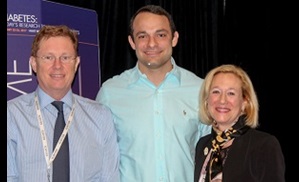Lab Members
Meet the ocular oncology laboratory’s team of visionary scientists.

Pictured: Dr. Bercin Tarlan, Kathryn Warnken, Dien Pham, Dr. Daniel Pelaez, Christina Decatur, Michael Durante, Dr. Margaret Sanchez, Jesus Sanchez Reyes, Barbara Perez, Karam Alawa, Jeff Wu, Parker Bussies, Dr. Stefan Kurtenbach, Dr. J. William Harbour, Dr. Jeffim Kuznetsov, Matthew Field, and Louis Cai.
Not pictured: Erin Ong and Dr. Julia Escandon.
Awards
2016 Medical Faculty Association’s Best Research Award

Vision Scientist: Matthew Field, Cancer Biology Graduate Program, MD/PhD student
Dissertation Title: Ocular Cancer Biomarkers, Mutation Profiles, and Therapeutic Strategies
2015 AACR-Ocular Melanoma Foundation Fellowship Grant

Vision Scientist: Stefan Kurtenbach, PhD
Research Title: BAP1 Loss Deregulates Neural Crest Guidance Cue Signaling in Uveal Melanoma
Synopsis: After treatment of primary uveal melanoma tumors, 50% of patients will develop macro-metastases and currently there are no FDA-approved targeted inhibitor treatments for metastatic UM. MEK-ERK1/2 signaling is activated frequently in uveal melanoma due to driver mutations in either GNAQ or GNA11. While MEK inhibitors are FDA-approved in cutaneous melanoma, they provide a 14% response rate and modestly improve progression-free survival in uveal melanoma. Dr. Kurtenbach proposal aims to utilize an in vivo reporter model to monitor the effects of the combination of MEK and CDK4/6 inhibitors and to identify optimal dosing schemes for this combination. Additionally, he will work on determining the effect of BAP1 status in the modulation of response to the combination leveraging new metastatic uveal melanoma cell lines, a new in vivo metastatic colonization model, and uveal melanoma patient samples from clinical trials. Dr. Kurtenbach hopes to ultimately provide the pre-clinical basis for targeted inhibitor combinations in late-stage uveal melanoma.
Findings: Although Dr. Kurtenbach’s research is ongoing, initial results found PRAME mRNA as the most significant predictor for metastasis in Class 1 tumors. These results have been published in Clinical Cancer Research